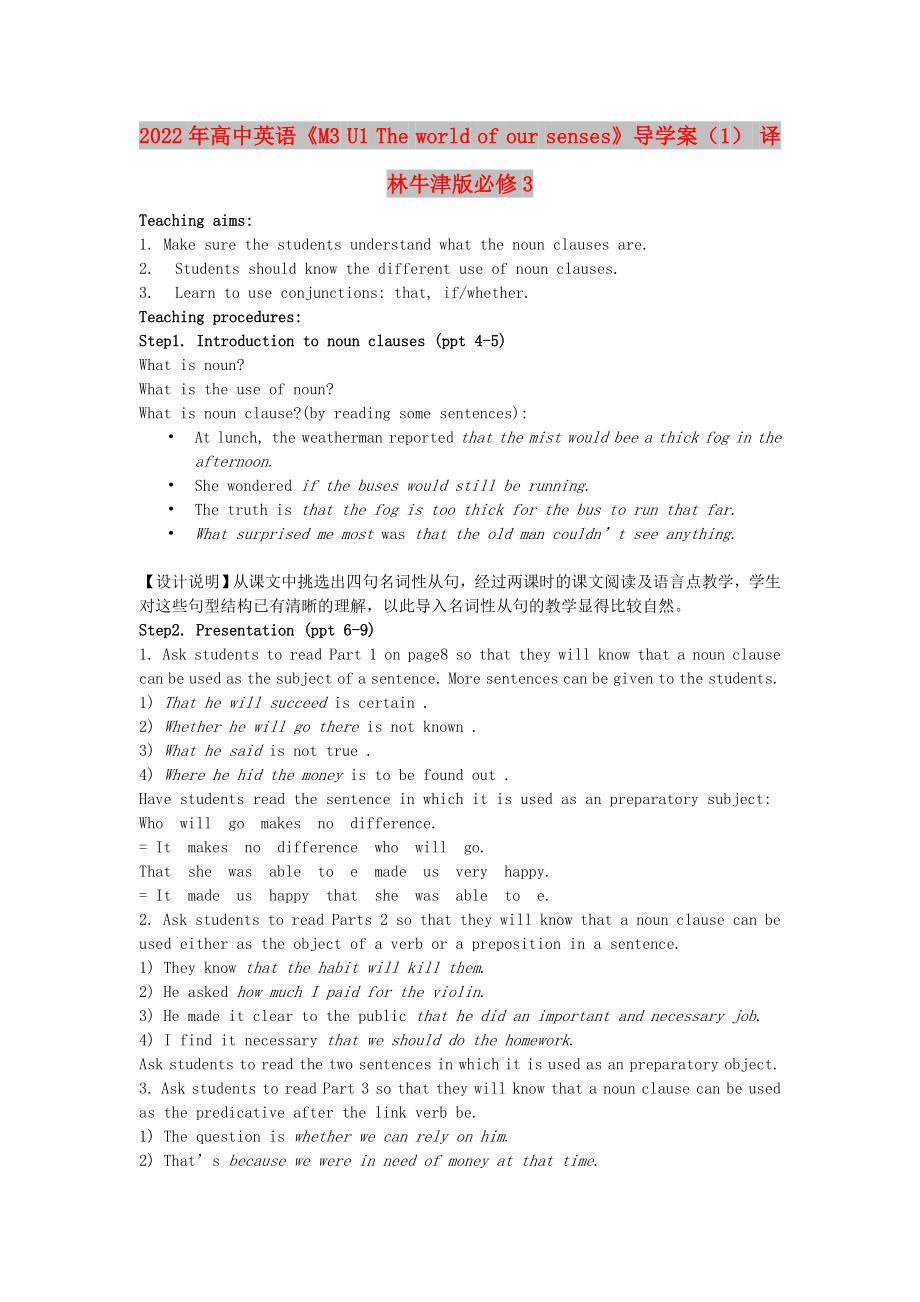《2022年高中英語《M3 U1 The world of our senses》導(dǎo)學(xué)案(1) 譯林牛津版必修3》由會員分享�����,可在線閱讀,更多相關(guān)《2022年高中英語《M3 U1 The world of our senses》導(dǎo)學(xué)案(1) 譯林牛津版必修3(2頁珍藏版)》請在裝配圖網(wǎng)上搜索�。
1���、2022年高中英語《M3 U1 The world of our senses》導(dǎo)學(xué)案(1) 譯林牛津版必修3
Teaching aims:
1. Make sure the students understand what the noun clauses are.
2. Students should know the different use of noun clauses.
3. Learn to use conjunctions: that, if/whether.
Teaching procedures:
Step1. Introduction to noun c
2、lauses (ppt 4-5)
What is noun?
What is the use of noun?
What is noun clause?(by reading some sentences):
? At lunch, the weatherman reported that the mist would bee a thick fog in the afternoon.
? She wondered if the buses would still be running.
? The truth is that the fog is too thick for th
3���、e bus to run that far.
? What surprised me most was that the old man couldn’t see anything.
【設(shè)計說明】從課文中挑選出四句名詞性從句,經(jīng)過兩課時的課文閱讀及語言點教學(xué)�,學(xué)生對這些句型結(jié)構(gòu)已有清晰的理解�����,以此導(dǎo)入名詞性從句的教學(xué)顯得比較自然����。
Step2. Presentation (ppt 6-9)
1. Ask students to read Part 1 on page8 so that they will know that a noun clause can be used as
4�����、the subject of a sentence. More sentences can be given to the students.
1) That he will succeed is certain .
2) Whether he will go there is not known .
3) What he said is not true .
4) Where he hid the money is to be found out .
Have students read the sentence in which it is used as an preparat
5�����、ory subject:
Who?will?go?makes?no?difference.
= It?makes?no?difference?who?will?go.
That?she?was?able?to?e?made?us?very?happy.
= It?made?us?happy?that?she?was?able?to?e.
2. Ask students to read Parts 2 so that they will know that a noun clause can be used either as the object of a verb or a pre
6�、position in a sentence.
1) They know that the habit will kill them.
2) He asked how much I paid for the violin.
3) He made it clear to the public that he did an important and necessary job.
4) I find it necessary that we should do the homework.
Ask students to read the two sentences in
7��、 which it is used as an preparatory object.
3. Ask students to read Part 3 so that they will know that a noun clause can be used as the predicative after the link verb be.
1) The question is whether we can rely on him.
2) That’s because we were in need of money at that time.
3) He looked as if
8、he was going to cry.
4) That’s why I was late.
4. Explain to students what apposition means. Then have the students read Part 4.
1) The news that he failed in the exam surprised his parents.
2) Word came that we would have two days off next week.
3) There is no possibility that our team will lo
9�����、se the game.
4) I’ll keep the promise that I will help you out when you are in trouble.
【設(shè)計說明】充分利用教材的英語講解���,幫助學(xué)生對名詞性從句的結(jié)構(gòu)有進(jìn)一步的了解。同時通過翻譯句子�����,補(bǔ)全句子等練習(xí)��,強(qiáng)化學(xué)生對名詞性從句的感性認(rèn)識��。
Step3. Practice
Ask the students to read the article on page 9 and to describe the main idea in their own words. Make sure that they kn
10�����、ow what they need to do and that they can identify all the noun clauses.
【設(shè)計說明】通過閱讀Pleasant smells reduce pain�,指導(dǎo)學(xué)生在理解文本的基礎(chǔ)上�����,找出該文中所含的11句名詞性從句���,并要求說出名詞性從句的類型����。
2. Have students read Part 2, which is about using if or whether to introduce a noun clause.
When do we use if/whether to introduce a noun clause?
When can we only use whether bet not it?
【設(shè)計說明】通過閱讀教材歸納的規(guī)則�,加之教師中文釋義���,學(xué)生對that, if, whether的用法進(jìn)行操練���。
Step5. Practice (ppt 14-24)
1. Ask students to finish exercises on page11.
2. Do some exercises.
【設(shè)計說明】在以上“明理”的基礎(chǔ)上��,設(shè)置操練�,讓學(xué)生學(xué)會運用�����。
 2022年高中英語《M3 U1 The world of our senses》導(dǎo)學(xué)案(1) 譯林牛津版必修3
2022年高中英語《M3 U1 The world of our senses》導(dǎo)學(xué)案(1) 譯林牛津版必修3

